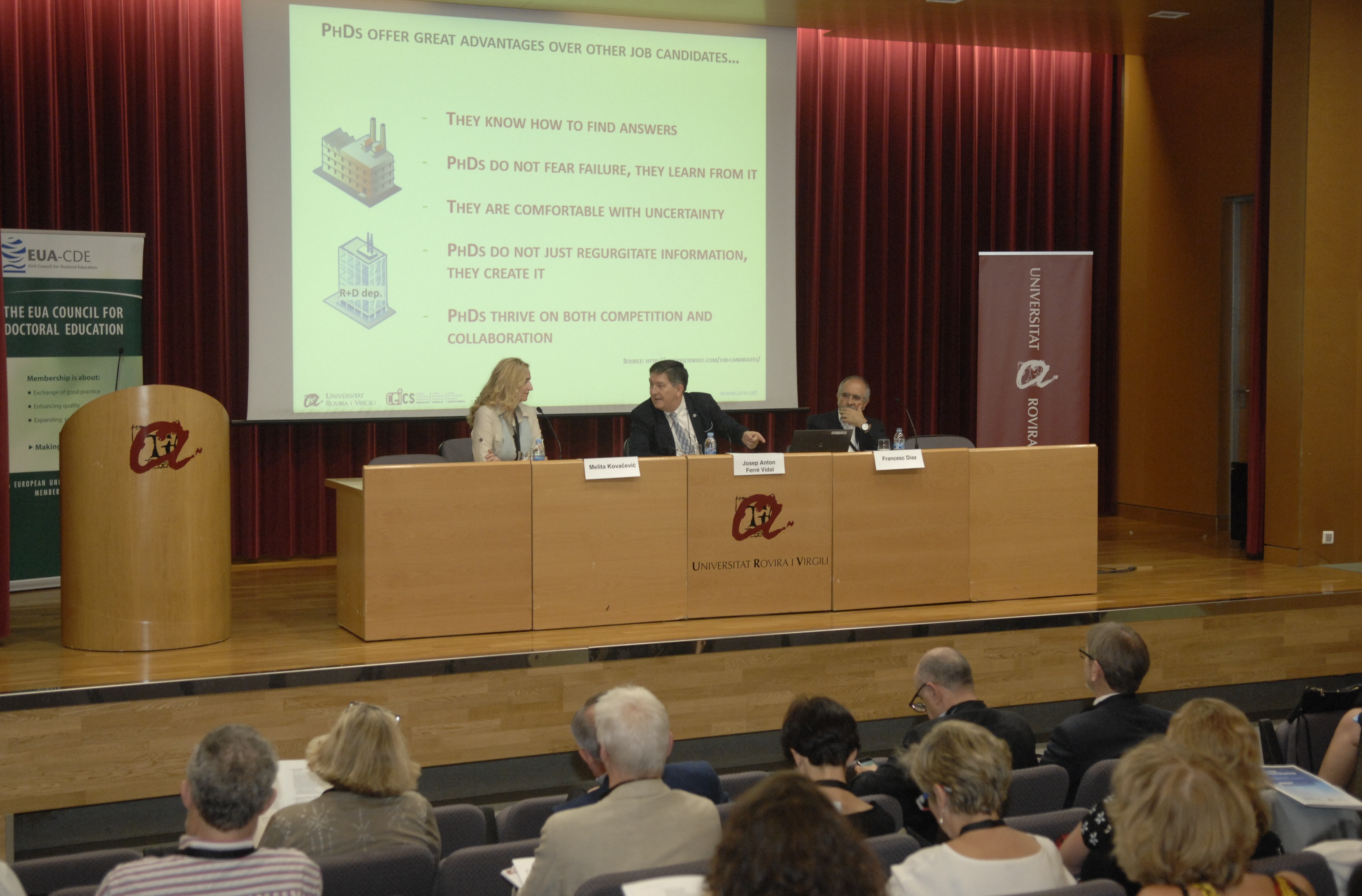16/06/2016
The future of doctoral studies: improving quantity, quality and employability
230 representatives from 143 institutions in 29 European countries have converged today on the Main Lecture Theatre at the Catalunya Campus to discuss doctoral training. The official opening of the meeting featured speeches from the URV’s rector Josep Anton Ferré, Francesc Díaz, director of the URV’s Postgraduate and Doctoral School, and Melita Kovacevic, from the University of Zagreb (Croatia). The meeting will last for two days and has been organised the Council for Doctoral Education (CDE) of the European University Association

230 representatives from 143 institutions in 29 European countries have converged today on the Main Lecture Theatre at the Catalunya Campus to discuss doctoral training. The official opening of the meeting featured speeches from the URV’s rector Josep Anton Ferré, Francesc Díaz, director of the URV’s Postgraduate and Doctoral School, and Melita Kovacevic, from the University of Zagreb (Croatia). The meeting will last for two days and has been organised the Council for Doctoral Education (CDE) of the European University Association
“Basic science, professional transversal competencies and basic personal skills”. These are the three ingredients that make up a good doctoral programme, according to the URV’s rector, Josep Anton Ferré, who opened the annual meeting of the European University Association’s (EUA) Council for Doctoral Education (CDE) here at the URV. This year’s meeting, under the heading “Doctoral training: a dilemma of quality and quantity?”, will conclude tomorrow and has brought 230 representatives from 143 institutions in 29 European countries to the URV’s Catalunya Campus.
Josep Anton Ferré presented the URV as a tool for creating value for people, companies and society, and gave an overview of its positioning in the international rankings. He also described the URV as “a university that is transversal and active in all areas of knowledge” and stated that the objective of a doctoral programme is that it should work for people and provide them with the skills that they need to take society forward.
Also present at the inauguration was Melita Kovacevic from the University of Zagreb (Croatia) and chair of the steering committee of the EUA-CDE, who expressed her pleasure that the meeting was taking place in Tarragona because it had given her the “opportunity to learn from the URV”.

More candidates and better skills
The inaugural session ended with a speech by Francesc Díaz, director of the URV’s Postgraduate and Doctoral School, who said that doctoral training must be expanded and improved to provide more students with better skills. In this regard, he reminded the audience that despite the generally high employment rates among doctoral graduates, many were currently working in underpaid jobs and he called for efforts to reverse this situation. Universities, he said, foster creative and strategic thinking and skills in the crucial areas of communication and financial and project management.
Díaz, who is also a researcher at the URV’s Department of Physical and Inorganic Chemistry, focused his speech on the measures that are currently being taken to improve doctoral education at the URV and also pointed to the growth that doctoral training has experienced internationally in recent years. The URV currently has 23 doctoral programmes, 708 thesis directors and 1248 doctoral students conducting research in all areas of knowledge. He also spoke of the University’s efforts to attract talent and international funding for doctoral training through initiatives such as the Martí i Franquès programme and the HR-excellence in research distinction.
Francesc Díaz concluded his speech by emphasising the need to “increase the number of doctoral candidates, but only if we can also improve the training they receive and consequently their employability “.
A leader in doctoral training
The EUA-CDE Annual Meeting is the most important annual international meeting on doctoral training. This year it is being held in Tarragona and will consist of two days packed with plenary sessions, conferences, round tables, working groups and time to listen to and share education experiences with doctoral students from across Europe. The talks focus on how universities can guarantee the quality of doctoral training both now and in the future. The aim is to generate discussion among the various people involved in doctoral training: university leaders, researchers, politicians, funding bodies and quality agencies, among others.
During the two days, attendees will learn about doctoral and research training policies in different European countries, the quality of graduates, and institutional and governance structures. Sessions have been prepared to discuss doctoral training success stories at different European institutions.
The CDE was created in 2008 and has since held meetings in European cities of Munich (2015) Liverpool (2014), Warsaw (2013), Stockholm (2012), Madrid (2011), Berlin (2010) and Lausanne (2009).
More information:
https://youtu.be/9X01zkHKxaQ
More news about: European University Association
